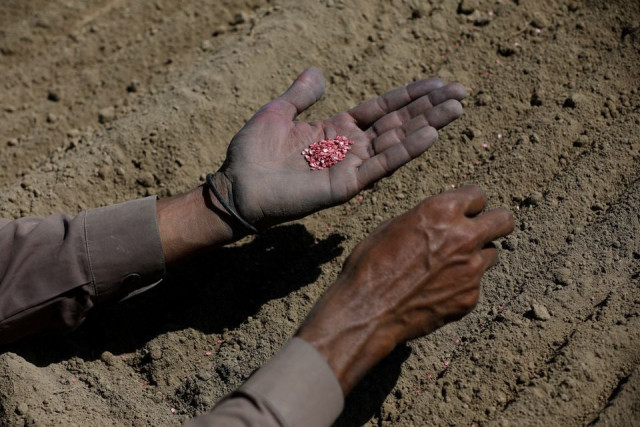Sewage water compromising crop quality
Dropping groundwater levels, unaffordability of tubewells has forced farmers to use polluted water for irrigation

With the public healthcare system already on the verge of collapse due to a severe shortage of medical staff and facilities, the uncontrolled usage of contaminated water for irrigating agricultural land risks kicking forth an unanticipated health emergency.
Despite the Punjab Food Authority (PFA) banning the use of contaminated water for crop irrigation in 2009, a failure of the supervising agencies to ensure adherence to safe irrigation standards has allowed multiple farmers located near the Indo-Pak border to utilize toxic water from a 54km long drain at Lallu village for cultivating their crops and others to turn to the Hudiara drain and water from sewers and factories for irrigation in other areas.
Also read: Water conservation in lower regions of Sindh stressed
Mohammad Ibrahim, a farmer from the Barki area, confessed to using contaminated water for irrigating his vegetables despite acknowledging the perilous repercussions of the proscribed move on consumers’ health. “Using water from the tubewell is no longer feasible since electricity has become very expensive. Therefore, we have no option but to use drain water for irrigating our crops,” said Ibrahim, who felt that the illegal practice of using polluted water for irrigation was prevalent in the country since its inception.
Seconding Ibrahim, Khairdin Mayo, a farmer highlighted another reason behind the high prevalence of polluted water usage by farmers for crop cultivation. “Groundwater levels have gone down drastically in recent times, due to which sewage water is the only option available in most cases for farmers to maintain agricultural yield,” shrugged Khairdin Mayo, who further revealed that the water supplied through the Bambawali-Ravi-Bedian (BRB) canal was only available for a few farmers.
According to a survey by the Punjab Food Authority (PFA), out of 1413 acres of agricultural land across the province, approximately 133 acres were using contaminated water for irrigating crops of vegetables including okra, cabbage, peas, green chilies, pumpkin, zucchini, bell pepper, mint, coriander, spinach, fenugreek, radish, radish pods and onions, all of which were openly sold in two major vegetable markets in Lahore namely Badami Bagh and Kahna.
Medical experts show earnest concern for the health of citizens who are unwittingly introducing remnants of contaminated water into their bodies by consuming some proportion of the aforementioned vegetables regularly in their diets.
“The levels of toxic elements like cadmium are dangerously high in vegetables which are cultivated in sewage water. Daily ingestion of these elements through food can lead to lung and kidney failure in adults, cognitive impairment in children and anemia in pregnant women,” alerted Dr. Shakeel Ahmed, a doctor at a local primary healthcare center.
Read: Experts demand steps to conserve water
Expanding on Dr. Ahmed’s concerns, Hammad Naqi Khan, Director General at an international non-governmental organization (NGO) claimed that the toxicity of polluted drain water was such that even standing near it for an extended period of time could prove detrimental for human health. “The results of our research carried out at the Hudiara drain revealed that villagers living nearby were suffering from hepatitis, poor vision and skin diseases,” asserted Khan.
Speaking to The Express Tribune on the matter, Dr. Anjum Ali Buttar, Director Extension at the Punjab Agriculture Department acknowledged that the cultivation of vegetables and other crops with contaminated water was highly perilous.
“We are organizing awareness campaigns for farmers in order to educate them on the public health hazards of using polluted water for irrigation,” assured Dr. Buttar.
Published in The Express Tribune, October 20th, 2023.



















COMMENTS
Comments are moderated and generally will be posted if they are on-topic and not abusive.
For more information, please see our Comments FAQ